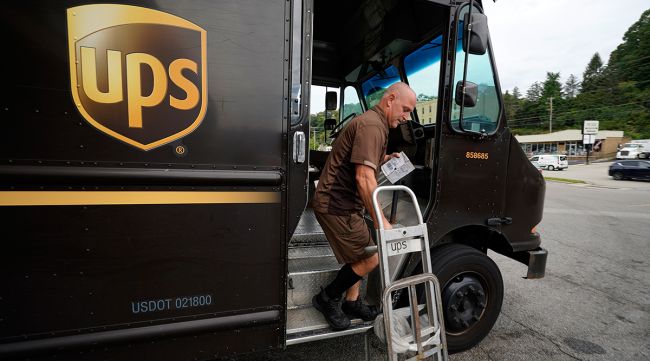The 340,000 employees of UPS Inc. represented by the International Brotherhood of Teamsters have approved a new five-year labor pact with the company, a vital step in a monthslong and at times contentious round of negotiations that brings new benefits to rank-and-file members.
The new deal, which was ironed out earlier this summer and approved in July by union leaders, will bring pay increases to those who drive and load the parcel carrier’s familiar brown delivery trucks.
The IBT said on Aug. 22 that 86.3% of its members who voted were in favor of the new contract.
Atlanta-based UPS confirmed the vote and said it was gratified by the support for the deal.
“Our Teamsters-represented employees have voted to overwhelmingly ratify a new five-year National Master Agreement that covers more than 300,000 full- and part-time UPS employees in the U.S. All local supplemental agreements also have been ratified except one, which will be finalized shortly. Voting results for agreements covering UPS employees under locals 705 and 710 are expected soon,” UPS said in a statement.
Our Teamsters-represented employees have voted to overwhelmingly ratify a new five-year National Master Agreement that covers more than 300,000 full- and part-time UPS employees in the U.S.
Read more below 👇
— UPS News (@UPS_News) August 22, 2023
That one supplemental agreement that remains to be worked out — out of 44 that were negotiated — covers 174 members in Florida. The union said that the National Master Agreement will go into effect as soon as this supplement is renegotiated and ratified.
“Our members just ratified the most lucrative agreement the Teamsters have ever negotiated at UPS. This contract will improve the lives of hundreds of thousands of workers,” Teamsters General President Sean O’Brien said.
“Together we reached a win-win-win agreement on the issues that are important to Teamsters leadership, our employees and to UPS and our customers,” Carol Tomé, UPS CEO, had said when the tentative deal was announced.
The Teamsters said the five-year agreement is valued at $30 billion in added wages and benefits for the delivery drivers, package handlers and others covered under the contract.
💥TEAMSTERS RATIFY HISTORIC UPS CONTRACT
Today, #Teamsters voted by an overwhelming 86.3 percent to ratify the most historic collective bargaining agreement in the history of @UPS: https://t.co/er6xXgCnfx#HotLaborSummer#1u ✊✊✊ pic.twitter.com/nVCCRuaCXD
— Teamsters (@Teamsters) August 22, 2023
The deal includes a pay raise for existing full- and part-time workers of $2.75 per hour in 2023 and $7.50 more per hour over the length of the contract.
Existing part-timers will see pay increase to no less than $21 per hour immediately. Current part-time workers will receive longevity wage increases of up to $1.50 per hour on top of new hourly rates, while new part-time hires would start at $21 per hour and eventually advance to $23 per hour. Other senior-level part-timers earning more under a market-rate adjustment will receive general wage increases.
Wage hikes for part-time represented workers will be double the amount of increases obtained in the previous UPS/Teamsters contract. The union said that existing part-time workers will receive a 48% average total wage increase over the next five years.
Part-time workers also will have priority to perform all seasonal support work using their own vehicles, with a locked-in eight-hour guarantee. For the first time, seasonal work will be restricted to five weeks over November-December.
The pay increases for full-timers will keep union UPS drivers as the nation’s highest-paid delivery drivers, the Teamsters said, with an average top rate of $49 per hour, or $101,920 a year, for a base 40-hour work week with no overtime.
The company said that by the end of the agreement full-time drivers will earn around $170,000 in annual pay and benefits.
The deal also put an end to a two-tier wage system for weekend delivery drivers who were added to the company’s ranks when UPS added weekend and seven-day-a-week service on Jan. 1, 2020. The contract also adds Martin Luther King Jr. Day as a paid holiday.
The deal also includes the creation of 7,500 new full-time union jobs and fulfillment of 22,500 open positions, establishing opportunities over the length of the contract for part-timers to transition to full-time work.
The company and union also agreed to what both said were significant health and safety improvements for drivers, adding air conditioning units in all new delivery vehicles, sprinter vans and package cars purchased after Jan. 1, 2024, and to install air conditioning in older trucks still on the road. Two fans, heat exhaust shields, and air induction vents in vehicles’ cargo compartments will be retrofitted.

Ryan Manthir of Shell Global Solutions and Michael Grahe of Navistar discuss the future of the internal combustion engine. Tune in above or by going to RoadSigns.ttnews.com.
The vote concludes a long and sometimes difficult contract negotiation. The threat of a strike by UPS workers had logistics experts worried about potential damage to the nation’s economy and supply chain, especially concerning a lack of capacity to absorb the volume of cargo that the company delivers every day. Businesses and individuals rely on UPS to move an estimated 25 million packages a day, totaling 6% of the nation’s gross domestic product.
The company on Aug. 8 acknowledged that the long negotiation and subsequent agreement will impact its future financials, lowering its full-year profit forecast in part due to rising costs after the agreement was reached. UPS in an earnings release said the change in guidance was “primarily to reflect the volume impact from labor negotiations and the costs associated with the tentative agreement.”
The UPS Teamsters National Master Agreement is the single largest private sector collective bargaining agreement in North America.
UPS Inc. ranks No. 1 on the Transport Topics Top 100 list of the largest for-hire carriers in North America.






